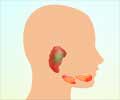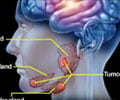The presence of SARS-CoV-2 on periodontal tissues has been demonstrated recently. Researchers now explored the existence of this virus in the cells of salivary glands.

‘Electron microscopic visualization of salivary gland tissues revealed that the novel coronavirus could replicate in the cells that make up those glands.’





To test the hypothesis of salivary glands being a room for coronavirus replication, the researchers analyzed the salivary glands of 24 patients who died from COVID-19 through ultrasound-guided autopsies. The tissue samples extracted from these glands underwent an RT-PCR test which revealed the presence of virus in more than two-thirds of the samples. Immunostaining procedures also revealed the presence of viruses in the tissue samples. When the researchers examined the samples under an electron microscope, they found that SARS-CoV-2 could also multiplicate in these tissues.
“We’re going to partner with researchers at the University of North Carolina in the United States to map the distribution of these receptors in the mouth and quantify viral replication in oral tissues,” said Luiz Fernando Ferraz da Silva, said principal investigator of the study.
It is important to note that the same research team demonstrated the traces of the novel coronavirus RNA in the tissues that surround teeth. The current study received support from the Sao Paulo research foundation, and findings were published in the Journal of Pathology.
“This is the first report of a respiratory virus’s capacity to infect and replicate in salivary glands. Until now, it was thought that only viruses that cause highly prevalent diseases such as herpes used salivary glands as reservoirs. The discovery may help explain why SARS-CoV-2 is so infectious,” highlighted Bruno Fernandes Matuck, a Ph.D. candidate at USP’s Dental School and first author of the article.
Advertisement
Source-Medindia










